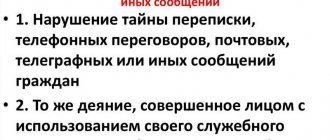1. Violation of the confidentiality of correspondence, telephone conversations, postal, telegraph or other messages of citizens - shall be punishable by a fine in the amount of up to eighty thousand rubles or in the amount of the wages or other income of the convicted person for a period of up to six months, or by compulsory labor for a period of up to three hundred and sixty hours, or correctional labor for up to one year.
2. The same act, committed by a person using his official position, is punishable by a fine in the amount of one hundred thousand to three hundred thousand rubles, or in the amount of the wages or other income of the convicted person for a period of one to two years, or by deprivation of the right to hold certain positions. or engage in certain activities for a term of two to five years, or compulsory labor for a term of up to four hundred eighty hours, or forced labor for a term of up to four years, or arrest for a term of up to four months, or imprisonment for a term of up to four years.
3. Part lost force on December 8, 2011 - Federal Law of December 7, 2011 N 420-FZ.
What is the article of the Criminal Code about?
The article talks about violations of telephone conversations, confidentiality of correspondence, postal, telegraph or other communications of citizens. It has 3 parts:
- the first deals with the punishment for a simple violation by an ordinary person (crimes of ordinary gravity);
- the second refers to punishment for the same act, but committed by a person using his official position (qualified personnel);
- the third part has become invalid.
Presentation and main provisions
The article talks about the secrecy of personal correspondence, which must be respected and not made available to the public. If this human right is violated, a fine or compulsory/corrective labor is imposed. If a crime is committed by a person using his official position, the punishment increases, up to imprisonment. The secrecy of personal correspondence (Article 138 of the Criminal Code of the Russian Federation) is a violation of the law and implies a number of penalties.
Types of punishment
Invasion of privacy, according to Article 138, is unacceptable if a person does not wish it.
If the violation is committed by an individual, the consequences are as follows:
- fine up to 80,000 rubles. or salary up to 6 months;
- compulsory work up to 360 hours;
- correctional labor for up to a year.
If the violation was committed by a person using his position in the service. The penalties will be different:
Industrial espionage and disclosure of trade secrets in Article 183 of the Criminal Code of the Russian Federation
- a fine of 100-300 thousand rubles or the wages of the convicted person for 1-2 years;
- deprivation of the right to hold a position or engage in activities for 2-5 years;
- compulsory work up to 480 hours;
- forced labor for up to 4 years;
- arrest up to 4 months;
- imprisonment for up to 4 years.
Surveillance of employees: protection of property or invasion of privacy?
19.01.38
Companies suffer losses not only from industrial espionage or theft of material assets (by the way, both relatives of employees and beloved clients strive to steal). Work time is stolen every day and everywhere, and on a large scale. To combat endless smoking breaks, I-net communication, etc., some employers organize “surveillance” of their staff. What else can you call wiretapping, e-mail monitoring, analysis of visited sites and total video surveillance? Sometimes, in an effort to protect the company, management goes beyond the boundaries of legality...
Ownership and personal rights of workers
Labor relations are relationships of power and subordination. The employee undertakes to perform a certain job function in the interests of the employer, and therefore, under his leadership and control. By acting in accordance with an employment contract, you inevitably, to a certain extent, subordinate your personality to the power of the employer: you cannot arbitrarily leave the workplace, you cannot fail to show up for work without risking exposing yourself to negative consequences, including dismissal for absenteeism.
The state sanctions the employer's economic power, establishes its legal form through labor legislation, and at the same time defines its limits. (In part, labor law arose in order to protect the employee from the excessiveness of this very “master’s power.”) In addition, when entering into hired labor relations, we continue to exercise our constitutional rights: the right to privacy, personal and family secrets, to protect their honor and good name, to the confidentiality of telephone conversations and correspondence. Nobody canceled them.
The Constitution of the Russian Federation protects private property (Article 8; 35). At the same time, it also protects the privacy of a citizen (Part 1 of Article 23). Our most important law also protects the privacy of correspondence, telephone conversations, postal, telegraph and other messages, establishing that restrictions on this right are allowed only on the basis of a court decision (Part 2 of Article 23). It turns out that there is a conflict of rights of the parties to the employment contract. Such a disagreement requires establishing a certain balance between the interests of the employee and the employer. When establishing this balance, certain restrictions on the corresponding rights are possible.
The Constitution of the Russian Federation establishes: restrictions on constitutional rights are possible, but only for certain purposes permitted by it and on the basis of federal law (Part 3 of Article 55 of the Constitution of the Russian Federation). The goal of protecting the rights and legitimate interests of owners is constitutionally significant. However, the employer should remember that it is possible to protect their rights only by legal means, and any form of control and surveillance must be clearly limited to its purposes and not exceed permissible limits. In other words, if the goal can be achieved with fewer means, then they should be used. Criteria for the legality of control measures
Often, employers carry out secret surveillance of employees using video cameras and other special means, and sometimes cameras are installed even in toilet rooms. However, surveillance using special means, including hidden ones, can only be carried out by special government services (operational units of the FSB, internal affairs bodies, agencies for control of the circulation of narcotic drugs and psychotropic substances, etc.).
Thus, we define the first rule of the internal security service: all introduced forms of control and surveillance must be transparent, employees and clients of the organization must be warned about them.
The second rule: control measures must pursue exclusively legitimate goals.
Public surveillance is permitted, but only for the legitimate purposes of protecting the employer’s property. For example, CCTV cameras can be installed in a sales area to prevent customers from stealing goods. Of course, in this case, the sellers’ workplaces fall under surveillance and the personal rights of workers are limited to some extent. Here, however, it is necessary to turn to the third rule - the rule of proportionality between the measures taken and the goals sought. Obviously, in the example under consideration, the observation zone should be limited to the workplaces of only those workers who are on the sales floor.
The law categorically prohibits an employer from establishing any secret means of monitoring staff.
Video surveillance is sufficient to prevent theft. But additional listening to conversations or recording them will violate the personal rights of both employees and clients, and clearly do not correspond to the declared purpose of control.
An example of an unlawful goal is attempts to stop “desertion” - dismissal of one's own free will - at an unfavorable time for the company, through viewing mail and listening to telephone conversations. An employer does not have the right to limit the freedom of work of its employees, while at the same time violating, by the way, their personal rights.
Fourth rule: the control procedure and goals must be prescribed in local regulations, and employees must be familiarized with them “against signature.”
Work and personal information
Experts often point to the nature of the information received by the employer as a criterion that allows them to distinguish between legal and illegal methods of protecting property. Thus, the Labor Code of the Russian Federation allows for the collection of personal data of an employee, but only for certain purposes, in particular, in order to control the quantity and quality of work performed and ensure the safety of property (clause 1 of Article 86 of the Labor Code of the Russian Federation). Based on this norm, it is concluded that the employer has the right to request work information (information about the quantity and quality of work performed). Therefore, a clear understanding of what is considered work information and what is personal is necessary. Finding this boundary in practice is extremely difficult, and sometimes impossible. A work email account or a company-paid cell phone is still personal and protected by the concept of “privacy.” The client can provide personal information to the employee, either about himself or someone else, which the employee cannot influence at all. In this regard, it must be reiterated that any covert form of eavesdropping on an employee's work phone or viewing an employee's work email is illegal.
At the same time, it is possible, for example, to publicly record conversations in call centers in order to monitor the performance of operators’ work duties or consider customer complaints: did the employee conduct the conversation competently, did he show politeness, etc. The rules for such control must contain the obligation to warn clients about the recording. It is also necessary to observe restrictions on the processing of information obtained through recording, including protecting it from private curiosity.
Another example. By providing an employee with a work mobile phone, the employer sets the rules for its use - for example, it limits payment or limits outgoing long-distance calls (all restrictions should be recorded in the relevant local act and the employee should be familiarized with it “under signature”). What information is the employer entitled to receive from the telecom operator? In the first case - only information about the total cost of calls to detect if the limit has been exceeded, and in the second - a list of calls.
Thus, one more important rule can be formulated - no total control! It stems from the requirement that the measures taken be proportionate and means that the restriction established by the employer may concern only one aspect of the privacy of private life, and not the entire secret as a whole. In the above example with telephone conversations, the restrictions apply only to information about which city the employee called on his work mobile phone.
It also seems that the employer has the right to establish rules for the use of personal mobile phones, stipulating that during working hours, mobile phones owned by employees are switched to vibrate alert mode, personal conversations are conducted in isolated rooms (free meeting rooms, kitchen) or in the elevator hall. The internal labor regulations can also include a provision that the employee undertakes not to abuse the use of the employer’s working time and resources for personal purposes. normative base
Constitution of the Russian Federation (Article 8; 23; 35; Part 3, Article 55).
Labor Code of the Russian Federation (Article 86; 91; 109; 258).
Criminal Code of the Russian Federation (Article 138).
Federal Law “On Operational Investigative Activities” dated August 12, 1995 No. 144-FZ.
Law of the Russian Federation “On private detective and security activities” dated March 11, 1992 No. 2488–1.
Decree of the Government of the Russian Federation of August 14, 1992 No. 589 “On approval of the Regulations on private security under the internal affairs bodies of the Russian Federation.”
Time control
What does the Law even mean by “working time”? Basically, the time during which the employee, in accordance with the internal labor regulations and the terms of the employment contract, must perform labor duties. The Labor Code of the Russian Federation, a number of federal laws and other regulatory legal acts of the Russian Federation also indicate other periods of time, which also apply to the worker (Part 1 of Article 91 of the Labor Code of the Russian Federation). In particular, we are talking about special breaks for heating and rest (Article 109 of the Labor Code of the Russian Federation) and breaks for feeding a child (Article 258 of the Labor Code of the Russian Federation).
The time required to perform natural necessities, which may include smoking, is not formally classified by the Law as a worker. Some companies install various automated means of monitoring the movement of employees around the office, as well as the time of their arrival and departure from work. Formally, they are right, but we believe that excessive control over toilet visits can only lead to a decrease in motivation. It is not a fact that the work of a person who has sat at the table “from bell to bell” is more effective than the work of a less disciplined colleague. Nevertheless, it is the employer’s right to determine priorities in the schedule.
Specialized security services
Separately, it is worth considering privacy issues in cases where the employer has hired a private security firm or uses corporate security services. In practice, security guards are charged with searching personal belongings and conducting body searches. It happened that employees of large networks complained about checking the contents of personal mailboxes in their absence. So, all these actions are illegal. The powers of private security companies (PSCs) are established in the Law of the Russian Federation of March 11, 1992. No. 2488–1 “On private detective and security activities.” Private security companies are designed to protect, including property (Part 1; 3, Article 3 of the Law), and not to carry out operational search activities, which include actions such as searches. Nevertheless, security guards can detain a person who has committed an unlawful encroachment on protected property and immediately report this to the internal affairs authorities. Moreover, the security officer is supposed to detain the offender only at the scene of the offense, that is, if the security guard himself was an eyewitness to the incident. Private security services, the services of which are provided by internal affairs bodies, have broader powers. They are established by Decree of the Government of the Russian Federation of August 14, 1992 No. 589 “On approval of the Regulations on private security under the internal affairs bodies of the Russian Federation.” According to clause 8 of the said Regulations, in order to fulfill the duties assigned to them, private security employees are given, in particular, the right:
– require employees of protected facilities and other persons to comply with access control regulations;
– detain violators;
– deliver suspects to security offices or to the police;
- carry out an inspection of things, and in exceptional cases - a personal search;
– use technical means;
- use firearms.
All these rights are exercised in accordance with the terms of the protection agreement and the law. The powers of the corporate security service are not comparable either with the powers of private security companies, or, even more so, with the powers of private security. In fact, they are no different from the employer rights described above. Responsibility for violation of privacy
Criminal liability has been established for violating the confidentiality of correspondence, telephone conversations, postal, telegraph or other messages of citizens. In accordance with Part 1 of Art. 138 of the Criminal Code of the Russian Federation for this crime one of the following sanctions is imposed:
Often, “secret surveillance officers” admit that their “catch” consists of gossip and nothing more.
– a fine in the amount of up to 80 thousand rubles or in the amount of wages or other income of the convicted person for a period of up to six months;
– compulsory work for a period of 120 to 180 hours;
– corrective labor for up to one year.
The same act committed by a person using his official position or special technical means intended for secretly obtaining information is punishable more severely (Part 2 of Article 138 of the Criminal Code of the Russian Federation):
– a fine in the amount of 100 to 300 thousand rubles or in the amount of wages or other income of the convicted person for a period of one to two years;
– deprivation of the right to hold certain positions or engage in certain activities for a period of two to five years;
– compulsory work for a period of 180 to 240 hours;
– arrest for a period of two to four months.
An employee who discovers that he is being followed can apply to the prosecutor's office to initiate a criminal case, as well as to the court with a claim for compensation for moral damage.
Author: Anna Gvozditskikh, lawyer, acting. O. Director of the Center for Social and Labor Rights, Moscow.
Publication date: 11/15/2010.
https://www.rhr.ru/index/rule/social_work_and_PR/16196,0.html
Share link:
Comments on Article 138
The article indicates that recording a conversation without the consent of the interlocutor is a direct violation of the privacy of correspondence.
Comments to it:
- Responsibility is established for violation of the confidentiality of correspondence, conversations by telephone or telegraph, including other messages (teletype, SMS, instant messengers on social networks). To qualify a crime, it does not matter regarding the medium and content of the information.
- The objective side of the crime is expressed in an active form of behavior, consisting in the performance of illegal actions that violate the secrecy of correspondence. Illegality of actions means gaining access and conducting negotiations under conditions not specified by law.
Listening to them, authorized on the basis of a judge’s order, cannot be considered a violation of the secrecy of telephone conversations. The conditions for this are stipulated in Federal Law No. 144.
If the subscriber agrees to familiarize himself with the contents of correspondence or telephone conversations, then although constitutional law has been violated, there is no corpus delicti:
- The corpus delicti is formal. The crime is considered completed if an act that violates the secret is committed.
- The subjective side of the crime implies guilt in the form of direct intent. The subject of the crime is a sane individual over 16 years of age. In a qualified composition, the subject is special - only a person who uses his position in the service for personal interests. It may enforce the powers and privileges of employment, including the terms of the employment agreement or contract.
- Breach of secrecy is any illegal action that results in information in negotiations becoming known to the perpetrator. These actions are illegal if they are committed against the will of the person in violation of current legislation.
- If the equipment with which the correspondence was received is included in the list approved by the Government, the penalty is imposed immediately.
You are being eavesdropped: who is being followed on the phone and how to understand it
MOSCOW, Oct 31 – PRIME, Ulyana Krainaya. According to Kaspersky Lab, Russia in the first half of the year became the leader in the number of people who encountered surveillance through spyware on a smartphone. Determining whether a device is infected with software for tapping phones is not always easy, according to experts interviewed by the Prime agency.
The expert named the main signs of wiretapping your phone
At the same time, you can protect yourself from illegal wiretapping by following a number of simple security rules. So, you should not give your phone to third parties or follow unknown links. It is important to regularly check the applications installed on your smartphone and disable it during confidential conversations. If you suspect wiretapping, you have the right to file a complaint with law enforcement agencies.
HOW TO DETERMINE THAT YOU ARE BEING LISTENED
To begin with, it is far from a fact that you will be targeted for wiretapping - there are certain risk groups. “Applications on the phone quite often listen to our conversations, but if we are talking about systematic surveillance, then there must be some reasons for it,” says director Pavel Myasoedov. So, partners or competitors may become interested in a businessman, and family members often try to control each other.
If the program was installed by a professional, then only a specialist will detect the bug; if it was done by a person with a minimum of knowledge, it will be easier to find traces.
The expert advised to take a closer look to see if the phone was behaving unusually: for example, it began to quickly discharge (especially a new device) or turn itself off. Another sign of possible wiretapping is the device becoming very hot during a conversation. But these are indirect signs and may indicate technical problems. It’s worse if programs begin to appear that the owner definitely did not install.
If you notice these unusual symptoms, it is better to save valuable information and reset your phone to factory settings. However, this method will not help if the bug is inside the case. “And the main safety rule is not to use donated gadgets,” Myasoedov warns.
If law enforcement agencies are “listening” to you based on a court decision, it is very difficult and sometimes impossible to determine this, continues Anatoly Mironov, head of the branch of the Moscow Bar Association “Zashchita”.
“As a rule, in such cases, communications, the Internet and the smartphone itself operate normally, and no miraculous set of numbers and symbols will determine the legal wiretapping of telephone conversations,” he warns.
From a legal point of view, the use of Internet telephony and instant messengers does not apply to telephone conversations, therefore the operational-search activity of “tapping telephone conversations” never contains data from WhatsApp or Telegram. However, this does not mean that operational services do not have the opportunity to obtain information of interest from there.
HOW WITNESS IS CONDUCTED
From a technical point of view, there are two options for wiretapping - indirect and direct, says Viktor Chebyshev, a mobile threat researcher at Kaspersky Lab. Indirect wiretapping is carried out using mobile base stations, but such equipment is expensive, and its capabilities are limited to intercepting voice calls and text messages.
A large volume of communications on a smartphone takes place in instant messengers or social networks, so they can also be of interest to attackers.
To intercept such messages, an attack method called “man in the middle” can be used: this is the interception of encrypted traffic from web versions of various services. However, modern applications, as a rule, already contain protection against such an attack, so here attackers resort to trying to infect a smartphone.
“In this case, we are talking about direct wiretapping: using the capabilities of the smartphone itself, as well as spyware or stalker software,” the specialist explained.
CAN IT BE PREVENTED?
To reduce the risk of infection with spyware, Chebyshev recommends downloading applications only from official stores and monitoring what permissions you give to installed programs, periodically checking the list of installed applications (if new, unfamiliar ones appear among them, this is a reason to be wary), and also installing protective solution for mobile devices.
The expert told who besides you can access your smartphone camera
Denis Kuskov, director of the information and analytical agency Telecom daily, adds that special software on a smartphone can be installed either unnoticed by a person, or by the person himself, unaware of it. This happens by downloading letters or other information, or by going to an unverified address.
If you download any applications, then you should carefully approach the issue of providing the amount of data to this software. When providing an application with a range of data that can be collected using the microphone and camera, it is worth understanding that this will be available to third parties.
The expert recommends not giving your phone to strangers, even if you are asked to make a call. If there is a need to convey confidential information, do it face-to-face, and not over a mobile phone.
“If you are conducting important confidential negotiations, then, if possible, put the phone aside and turn it off,” Mironov also advises.
LEGAL ASPECT
If you believe that your rights were violated by illegal wiretapping, then it would be logical to file an official statement with law enforcement agencies, which can bring the perpetrators to justice under Article 137 of the Criminal Code of the Russian Federation
“Violation of privacy” and Article 138 “Violation of the secrecy of correspondence, telephone conversations, postal, telegraph or other messages.”
If you become aware of a telephone wiretapping that violates your rights, which is carried out by law enforcement agencies themselves on the basis of a court decision, but you have not committed a crime, then under the Law “On Operational-Investigative Activities”, you have the right to request information about the information received about you.
“And, perhaps, the most basic advice: think about what you say, remember the ancient truth “by your words you will be justified, and by your words you will be condemned.” Control yourself, and then your gadget,” the lawyer concluded.
What does judicial practice show under this article?
Article 138 of the Criminal Code of the Russian Federation is violated very often, but judicial practice on it is not so extensive. Victims sometimes simply do not know that their confidentiality of correspondence is being violated, and if they do know, they rarely go to court. This is because people are embarrassed to file a claim because the information will be made public. Also, many do not have the money for a professional lawyer, and it is difficult to prove the case on their own.
Examples from judicial practice:
Illegal trafficking of special technical means in Article 138.1 of the Criminal Code of the Russian Federation and comments
- Citizen M. filed a lawsuit against his colleague P., who, in his opinion, violated the right of correspondence. P. worked as a system administrator, so he repeatedly read M.’s personal mail, which he accidentally told him about. The court found that P. had indeed violated the law and sentenced him to a fine of 80,000 rubles and payment of moral damages to M. in the amount of 30,000 rubles. P. was also deprived of his position and banned from engaging in this activity for a year.
- Citizen S. filed a lawsuit against her partner T., who had access to her phone and disclosed her SMS to a friend. They contained personal information, the publication of which S. did not give personal consent to. The court ruled that T. was guilty and sentenced him accordingly under Art. 138 of the Criminal Code of the Russian Federation in the form of a fine of 20,000 rubles and correctional labor for a period of 1 month.
- Citizen I. filed a lawsuit against the police of city V. He believed that his calls were wiretapped, which is illegal. The evidence presented was recorded noises and interference in a telephone conversation, which I. considered to be wiretapping. The court found out that the investigation actually wiretapped I.’s phone, but he had permission to do so. The claim was rejected.
What decisions are most often made under Article 138?
According to Art. 138 of the Criminal Code of the Russian Federation, guilty decisions are made more often. This is due to the fact that the defending party provides objective evidence. The accused party does not have any justifying circumstances, except for the investigation, which established that the person was being monitored. This must be authorized by a judge or prosecutor. Police officers do not have the right to install such equipment on their own.
Most often, criminals receive a fine and punishment in the form of deprivation of office. It is rare that the accused is punished with correctional and forced labor, arrest, or imprisonment. Victims may also request payment for moral damages, which will be paid in an amount determined by the court.
Features of punishment
The penalties provided for in the article do not have direct aggravating or mitigating circumstances. There is a difference between punishments for ordinary individuals and those who abuse their official position. The sentencing may be influenced by the presence of a minor child of the accused, but since a fine is more often imposed, this is not an important condition.
The previously existing third part of the article contained information about acts related to crimes of medium gravity. Now it is no longer there because it has been declared invalid.
Part 3 also previously discussed the illegal production, sale or receipt for sale of technical means that were used to obtain information.
We recommend the popular Zen channel “https://zen.yandex.ru/build-experts.ru/”, where you will find a lot of useful information for summer residents and gardeners.
Official website of the Supreme Court of the Russian Federation
The Supreme Court of Russia intends to protect citizens from troubles when purchasing high-tech devices and toys that allow them to secretly record something.
The plenum of the Supreme Court discussed a draft resolution that clearly states which equipment is considered spyware, and therefore subject to jurisdiction. Moreover, the document explains that in such matters it is always necessary to clarify the person’s goals. If you planned to collect a secret dossier on your neighbors, this is certainly within your jurisdiction. If he didn’t know that the Chinese gift, some kind of pen, had a secret microphone, then there’s nothing to judge.
Let us remind you that the Criminal Code has an article punishing the use of special equipment to secretly obtain information. As Peter Kondratov, judge of the Supreme Court of the Russian Federation, explained when presenting the draft resolution, citizens often buy, for example, trackers - devices that track movement. They are used, for example, against car theft or childcare.
“However, the acquisition of such devices, including through publicly available Internet resources where they are advertised as household appliances, may turn out to be very unsafe for the purchaser from the point of view of criminal prosecution,” the judge noted. Because cases were often filed against buyers for allegedly using spy equipment.
According to the judge-reporter, the prepared explanations are intended to “exclude cases of unjustified criminal prosecution.”
According to these clarifications, “the actions of a person who purchased a device intended for secretly obtaining information for use, for example, for personal safety, the safety of family members, including children, the safety of property or for the purpose of tracking animals cannot be qualified under the article of the Criminal Code.” and did not intend to use it as a means of encroaching on the constitutional rights of citizens (including interference in the privacy of others).”
For example, there are cases when people were put in the dock for selling GPS trackers for cars. Some of these devices allow you to make audio recordings (this can be useful if the car is stolen). Once the ruling is passed, such cases should fall apart in court.
Previously, the article could include people who bought a GPS tracker for a car: some devices record conversations in the car
Another story: law enforcement officers opened a case against a farmer who bought a GPS tracker to keep an eye on an unruly calf. The Supreme Court's clarifications protect a person from a conviction in this case.
You can buy ordinary gadgets with confidence. Smartphones, voice recorders, video recorders, etc. can be recognized as special means only “provided that they are deliberately, through special technical modification, programming or other means, given new qualities and properties that make it possible to secretly receive information with their help.” Simply put, a regular telephone is not subject to jurisdiction. If a person installed a cunning program that turns an ordinary phone into a real James Bond gadget, then he will have to answer to the court.
By the way, according to judicial statistics, in 2011, 49 people were convicted under Article 138.1 of the Criminal Code of the Russian Federation “Illegal trafficking in special technical means intended for secretly obtaining information.” And in 2021 - already 236. Last year - 257 people. Over the six months of this year, there were 86 convicts. Probably, after the problem began to be widely discussed, practice gradually began to change. Prepared explanations, according to experts, will further protect citizens from incidents.
In addition, the draft plenum clarifies what exactly is considered a violation of the secrecy of correspondence and negotiations.
“Courts should keep in mind that the secrecy of correspondence, telephone conversations, postal, telegraph or other messages is considered violated when access to both their content and information about the very facts of correspondence, negotiations, messages was made without the consent of the person whose secret they are constitute,” the document says.
A violation of the secrecy of telephone conversations is illegal access to information about incoming and outgoing connection signals - date, time, duration of connections, subscriber numbers, and other data that allows subscribers to be identified. Simply put: detail. If you tell everyone who the subscriber called and when, it will be subject to jurisdiction.
At the same time, the draft clarifies that familiarization with the fact or content of correspondence, negotiations, messages with the voluntary consent of at least one of the persons whose secret messages they constitute does not constitute a crime. But here, too, there are limitations: if, after such familiarization, information about the private life of a citizen was disseminated, constituting his personal or family secret, without his consent, then the actions of the guilty person fall under the Criminal Code. If the interlocutor did not give permission to make public the information expressed in a private conversation, the disclosure may fall under the article.
Text: Vladislav Kulikov
Russian newspaper - Federal issue No. 7730 (267)









